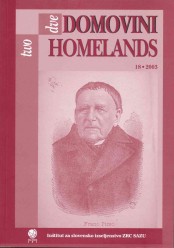THE ORIGINAL STROKES OF ACTIVITY OF THE MISSIONARY FRANC PIRC
Abstract
Franc Pirc (1785–1880) has among Slovene missionaries an authentic place because of his beleated decision to become a missionary, and because of his original approach to the environment in which he was active. He operated on the territory of two dioceses: Detroit, Michigan (1835-1852) and St. Paul, Minnesota (1852–1873). He set the foundations for the subsequent diocese St. Cloud, Minnesota. Besides his fundamental goal – to acquaint the Ottawa and Chippewa Indians with the gospel and establish among them Christian communities, Pirc was striving for the preservation of their cultural originality and rights, which were in the very period of accelerated formation of the United States and intensive colonisation even more menaced. Thus his work was not limited to only spreading Christianity; Pirc always had before his eyes all dimensions of life of Indian communities, particular was his concern for their health. As he was a writing man, he frequently sent letters to the press in Slovenia and wrote long reports for the Leopoldina’s missionary society in Vienna, which was the organiser of a systematic collecting of means for missions in North America. Franc Pirc has prepared several Indian and German texts of which the majority remained in manuscript. In various ways, he collected means needed for the operating of missionary stations, and spread information on missionary work. Pirc gained several co-workers for the continuation of his missionary and cultural work among the Indinas; his sole visit to Carniola in 1864 was destined to that goal. Of especially witnessing significance are his reports to the bishops of Ljubljana, A. A. Wolf and J. Vidmar. As a very practical and versatile man, Pirc brought to realisation a number of initiatives that have improved the everyday life of the Indians. At the same time, he was setting foundations for the church communities that European emigrants formed. Along that, Pirc was during his entire stay in America maintaining contacts with the Slovene space where he had a good reputation. After his return to Ljubljana in 1873, his compatriots named him “patriarch of Indian missions”.
Downloads
Downloads
Published
How to Cite
Issue
Section
License

This work is licensed under a Creative Commons Attribution-NonCommercial-NoDerivatives 4.0 International License.
Authors guarantee that the work is their own original creation and does not infringe any statutory or common-law copyright or any proprietary right of any third party. In case of claims by third parties, authors commit their self to defend the interests of the publisher, and shall cover any potential costs.
More in: Submission chapter





